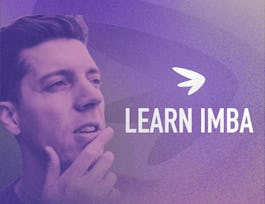Have you ever wondered what happens to the registration details after you click on the submit button or to the order details once you press the confirm order button when you try to access any website? From where do you think, the details of the product catalogue are fetched to be displayed on the browser?



Implement Polyglot Persistence Using SQL and NoSQL Databases
This course is part of RESTful Microservices Using Node.js and Express Specialization

Instructor: NIIT
What you'll learn
Implement Polyglot Persistence using MySQL and Mongo Database
Skills you'll gain
Details to know

Add to your LinkedIn profile
2 assignments
See how employees at top companies are mastering in-demand skills

Build your subject-matter expertise
- Learn new concepts from industry experts
- Gain a foundational understanding of a subject or tool
- Develop job-relevant skills with hands-on projects
- Earn a shareable career certificate


Earn a career certificate
Add this credential to your LinkedIn profile, resume, or CV
Share it on social media and in your performance review

There are 2 modules in this course
Over the last 3 decades, RDBMS has been a stable database for large global corporations and small business. Most employers mandate SQL skills as a necessary check in their recruitment process. As a software engineer, you will be required and be able to work with MySQL database to create, store, query and analyze data from RDBMS. In this learning sprint, you will learn how to model data using the ER diagram. You will implement MySQL shell commands to perform CRUD operations. The hands-on exercises, in this learning sprint will also enable you to build RESTful APIs using Node.js and MySQL database.
What's included
17 videos2 readings1 assignment2 programming assignments
For a customer facing system of engagement, it is crucial to have a database that can handle unstructured and unpredictable data. NoSQL document database like MongoDB fulfills this criteria. As a back-end programmer, you will be required to resolve the mismatch between the storage and application systems and accordingly model data to make processing efficient. In this learning sprint, you will identify steps to model data for MongoDB database. You will learn to setup MongoDB in local machines and perform CRUD operations using the shell commands. In addition, the hands-on exercises will help you gain experience with various techniques used to integrate MongoDB with Node.js RESTful APIs.
What's included
22 videos1 reading1 assignment2 programming assignments
Recommended if you're interested in Software Development
Why people choose Coursera for their career




New to Software Development? Start here.

Open new doors with Coursera Plus
Unlimited access to 7,000+ world-class courses, hands-on projects, and job-ready certificate programs - all included in your subscription
Advance your career with an online degree
Earn a degree from world-class universities - 100% online
Join over 3,400 global companies that choose Coursera for Business
Upskill your employees to excel in the digital economy
Frequently asked questions
Access to lectures and assignments depends on your type of enrollment. If you take a course in audit mode, you will be able to see most course materials for free. To access graded assignments and to earn a Certificate, you will need to purchase the Certificate experience, during or after your audit. If you don't see the audit option:
The course may not offer an audit option. You can try a Free Trial instead, or apply for Financial Aid.
The course may offer 'Full Course, No Certificate' instead. This option lets you see all course materials, submit required assessments, and get a final grade. This also means that you will not be able to purchase a Certificate experience.
When you enroll in the course, you get access to all of the courses in the Specialization, and you earn a certificate when you complete the work. Your electronic Certificate will be added to your Accomplishments page - from there, you can print your Certificate or add it to your LinkedIn profile. If you only want to read and view the course content, you can audit the course for free.
If you subscribed, you get a 7-day free trial during which you can cancel at no penalty. After that, we don’t give refunds, but you can cancel your subscription at any time. See our full refund policy.






